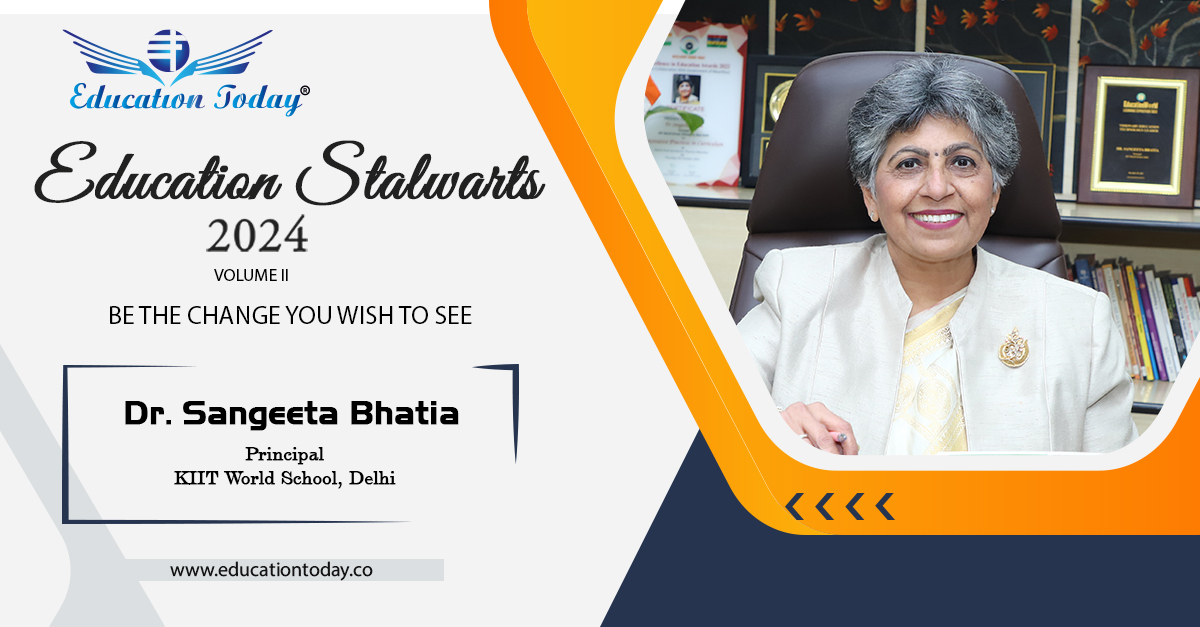Q. Could you provide us with a brief overview of your professional background and areas of expertise?
I started working alongside with completing my doctoral studies. From early morning scrums to dinner conversations, teaching absorbed me – it was more than a job, it continues to be my life force. I have been associated with K-12 education for over four decades now, serving at the KIIT World School in West Delhi, and at an institutional level with many statutory bodies.
Having graduated in Chemistry Honours from Miranda House, Delhi University, I pursued my Master’s degree from the same college, going on to earn a Ph.D. in Bio-Inorganic Chemistry from Delhi University and publishing articles in peer-reviewed journals. I completed my B.Ed. at Annamalai University.
I focus on evolving teaching-learning paradigms to stay ahead of the times. As you can imagine this is always WIP or Work-in-Progress - for the children who start school today will work in the world of tomorrow, leaving us around 2035! We ask ourselves what their world will look like and encourage attitudes of lifelong learning. Investment of our time and energy in developing new pedagogies and curricula is an important aspect of how we as educationists must assess our own contribution. So, I engage with stakeholders across the education ecosystem to implement constructive change - for 1 believe that action must take vision forward.
Q. Could you highlight some of your key accomplishments in the field of education?
I am honoured to have received the National Award to Teachers in 2008 from the President of India through the Ministry of Education (MoE), Govt. of India. As Senior Vice President, Delhi State Science Teachers’ Forum, I am deeply involved with STEM teaching, and have been a Master Trainer at CBSE as well as a Member of the Governing Body, CBSE and Chairperson, North-West Delhi Sahodaya School Complex. Recognition also includes both the CBSE National Teachers Award and the CBSE State Teachers Award.
My greatest satisfaction though comes from creating a joyful campus and honing the talent of teachers. With over 5,000 alumni excelling in diverse professions, from medicine and law to media and entrepreneurship, I find true satisfaction. Meeting them in my office or around the world reinforces a sense of accomplishment.
Yet, I believe that educators have a large responsibility and if I may paraphrase Frost’s immortal words “…we have promises to keep, and miles to go before we sleep…”
Q. What impactful changes or innovations have you implemented in the education segment, and what further advancements would you like to see or implement in the field of education?
Innovation is the continuing journey of KIIT World School since its establishment in the 1960s. We have introduced new initiatives year after year, and then worked to improve these seed projects and then stabilise them. There has been Innovation in every aspect of teaching and learning - innovation and curiosity are our DNA as KIIT stands for the Kamrah Institute of Innovative Teaching. Curriculum Planning, the introduction of 21st century skills in curriculum, assessment & evaluation norms including the use of Anecdotal Records, the development of pedagogical tools and sustainability & citizenship play out experientially in our classrooms. There is constant reflection too for example during the Class Climate Survey teachers step back and reflect on feedback.
We are recognised for deep personalisation that we bring to each student's learning. The initiatives that are closest to me are those that focus on individualised learning. We have developed and honed approaches like Micro Analysis and Reflective Journalling that skew the bell curve to the right, taking more and more students from the middle range towards excellence. This year we found that in subjects as diverse as Physics and Commerce, many students achieved an A grade, indicating that the promise and possibilities of children are not the prerogative of a few 'toppers'.
We have already travelled a fair distance towards futuristic initiatives that were started years ago. From art integration to phenomena-based learning, we follow a broad curriculum and a multi-disciplinary approach. The social and emotional skills of children are a priority too. We look for new ways to integrate with a larger community as this 'connect' is important for education to thrive. I am an advocate of integrating the global dimension into curricula, and there is cultural and educational exchange with countries like the UK, South Korea, Germany, Uganda and Poland.
Q. What advice can you give emerging education professionals/fellow educators regarding essential leadership qualities in this field?
There is only one benchmark for success as an educator. Every day we must ask of ourselves, have we carried ourselves as role-models for children to emulate? Children absorb all that the parents, teachers and adults do and what they say. They take in and learn our intrinsic values and beliefs that reveal themselves in the way we conduct ourselves. And these children then go on to reflect whatever they see and hear in their immediate environment. We hold the position of a parent to the many children in our schools. When we enter our schools, we must be mindful and aware of how we conduct ourselves. Have we invested time and energy to bring the best of ourselves to our children? Have we enriched our own learning to develop their abilities and talents for their future?
I believe that every educationist must be accountable for the learning outcomes in the classroom and outside, and that is rooted in their own personal growth and development.


Comments